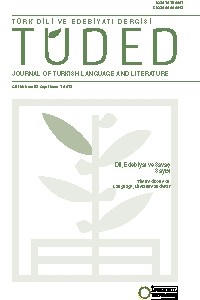Soğd Ses Sistemi ve Uygur Alfabesinin Kökeni*
Eski Uygurlar tarafından Soğd alfabesinden türetilerek oluşturulan on sekiz harfli Eski Uygur alfabesi, yüzyıllar boyunca gerek Türk milleti gerekse Orta Asya’daki bazı komşu kavimler tarafından kullanılmış ve bu alfabe ile pek çok eser kaleme alınmıştır. Nicholas Sims-Williams tarafından yazılan ve Journal Asiatique’in 269. cildinde (1981) yayımlanan bu makalede Uygur alfabesinin temelini teşkil eden Soğd alfabesi hakkında bilgi verilmiş, bu alfabe ile Uygur alfabesi arasında hangi farklılıkların bulunduğu açıklanmıştır. Harflerin temsil ettiği sesler detaylı bir şekilde incelenmiş ve Uygurların alfabeyi hangi şekilde türettiği noktasında bazı fikirler öne sürülmüştür.
Anahtar Kelimeler:
Sims-Williams, Eski Uygur alfabesi, Soğd, alfabe, ses sistemi, ses sistemi
The Sogdian Sound-System and the Origins of the Uyghur Script
The eighteen letter Old Uyghur alphabet, which was derived from the Sogdian alphabet by the Old Uyghurs, was used for centuries by the Turkish nation and some neighbour nations in Central Asia. Many works are written in this alphabet. In this article, originally published in English in the 269th issue of Journal Asiatique (1981), Nicholas Sims-Williams provided information about the Sogdian alphabet, which is the basis of the Uyghur alphabet, and explained the differences between the Uyghur and Sogdian alphabets. The sounds represented by the letters are clarified in detail and some ideas are put forward as to the way in which the Uyghurs adapted the alphabet.
Keywords:
Sims-Williams, Sogd, sound-system, Old Uyghur alphabet, alphabet, sound-system,
___
- CLAUSON 1962 = Sir Gerard Clauson, Turkish and Mongolian studies, London, 1962.
- [ÇN. Bkz. Sir Gerard Clauson, Türkçe-Moğolca Çalışmaları, Çev. Fatma Kömürcü, TDK Yayınları, Ankara 2017]
- GMS = Ilya Gershevitch, A grammar of Manichean Sogdian, Oxford, 1954.
- HENNING 1939 = W. B. Henning, “Sogdian loan-words in New Persian”, BSOS, X, I, 1939, s. 93-106.
- HENNING 1958 = id., “Mitteliranisch”. Handbuch der Orientalistik (ed. B. Spuler), Abt. I, Bd. 4: Iranistik. Abschnitt 1: Linguistik, Leiden, 1958, s. 20-130.
- LIVSHITZ 1970 = V.A. Livshitz., “A Sogdian alphabet From Panjikant”, W.B. Henning memorial volume (ed. M. Boyce & I. Gershevitch), London, 1970, s. 256-63.
- MÜLLER-LENTZ 1934 = F. W. K Müller & W. Lentz, “Soghdische Texte II”. SPAW, 1934, s. 504-607.
- SIMS-WILLIAMS 1972 = Nicholas Sims-Williams, “A Sogdian ideogram’’, BSOAS, XXXV, 3, 1972 s. 614-15.
- SIMS-WILLIAMS 1975 = id., “Notes on Sogdian palaeography”. BSOAS, XXXVIII, 1, 1975, s. 132-9.
- SIMS-WILLIAMS 1978 = id., Review of D. N. MacKenzie, The Buddhist Sogdian texts of the British Library, IIJ, XX, 3-4, 1978, s. 256-60.
- SIMS-WILLIAMS çıkacak olan = id., “Remarks on the Sogdian letters γ and x (with special reference to the orthography of the Sogdian version of the Manichean church-history)”, W. Sundermann, Mitteliranische manichäische Texte kirchengeschichtlichen Inhalts adlı çalışmada bölüm olarak yayımlanacaktır.
- [ÇN. Bkz. W. Sundermann, Mitteliranische manichäische Texte kirchengeschichtlichen Inhalts, (Berliner Turfan Texte 11), Brepols Publishers, Berlin 1981]
- SKJÆRVØ 1976 = P.O. Skjærvø, “Sogdian notes’’, AO, XXXVII. 1976, s. 111-16.
- ISSN: 1015-2091
- Başlangıç: 1946
- Yayıncı: İstanbul Üniversitesi
Sayıdaki Diğer Makaleler
Ahmet Bican Ercilasun, Türk Kağanlığı ve Türk Bengü Taşları
Dilbilim Kavramlarıyla Türkçe Dilbilgisi
Ses Sembolizmi ve Ses-Anlam Uyumunun Farklı Bir Sınıflandırma Denemesi
Soğd Ses Sistemi ve Uygur Alfabesinin Kökeni*
Nicholas SİMS-WİLLİAMS, Feryal KORKMAZ, Berker KESKİN
